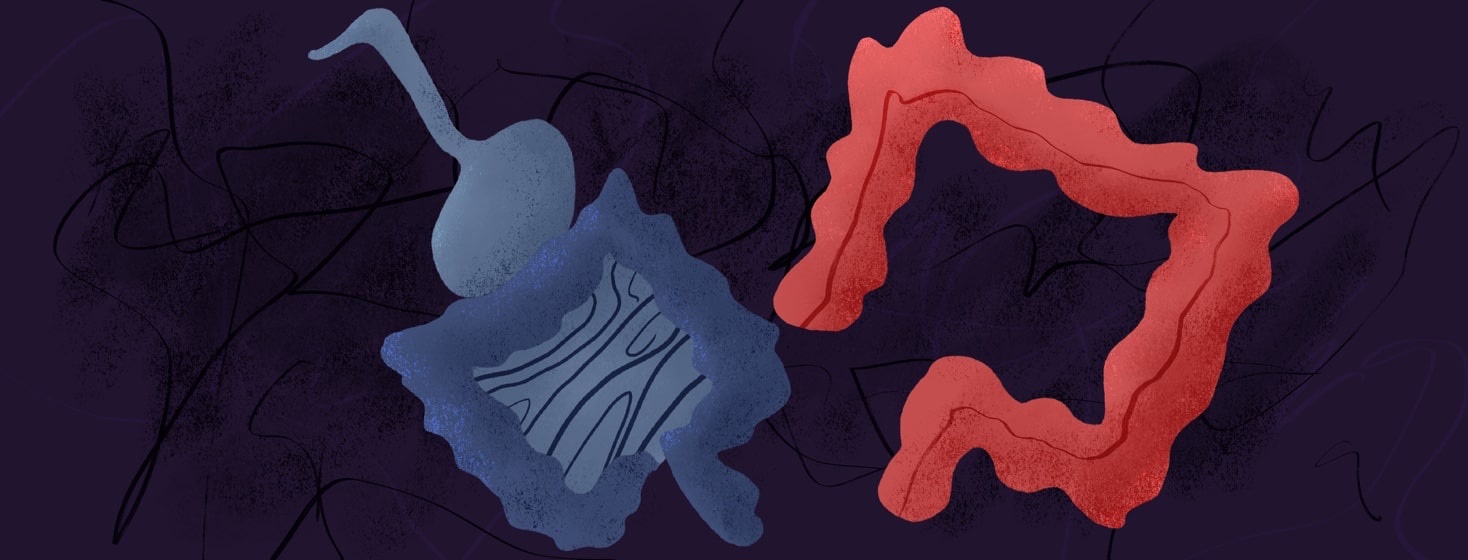Digestion Issues and Lupus
Reviewed by: HU Medical Review Board | Last reviewed: August 2024 | Last updated: August 2024
In people with lupus, the immune system attacks healthy tissue. Lupus can damage nearly every organ in the body and lead to a wide variety of symptoms. In fact, 2 people with lupus may experience completely different symptoms. But around half of people with lupus have digestive symptoms.1
The digestive tract is also known as the gastrointestinal or GI tract. The GI tract runs from the mouth to the anus. The broader digestive system also includes the liver, gallbladder, and pancreas. Lupus can affect any part of the digestive system, causing symptoms such as:2
- Belly pain
- Nausea
- Diarrhea
Along with the disease itself, certain treatments for lupus can lead to digestive symptoms.2
What are some digestive symptoms of lupus?
The digestive symptoms of lupus vary depending on their exact cause and which part of the digestive system they affect. They can range from inconvenient to life-threatening. Here are some common examples.1-3
Symptoms related to the mouth and esophagus
Lupus can cause mouth sores that resemble canker sores. This is 1 of the primary symptoms that doctors look for to diagnose lupus.1
Further down the GI tract, lupus can cause swelling (inflammation) or weakening of muscles in the esophagus. The esophagus is the tube that food travels down from the mouth to the stomach. When muscles in the esophagus are weakened or swollen, it may become hard to swallow. Trouble swallowing is called dysphagia, and it can be dangerous, especially during eating or drinking.2,3
When the muscle between the esophagus and the stomach is weak, stomach acid can travel the wrong way, back up into the esophagus. This is known as gastroesophageal reflux, or just reflux. Reflux that occurs regularly is called gastroesophageal reflux disease, or GERD. Reflux can lead to symptoms such as:2,3
- Heartburn
- Chest pain
- Regurgitation (food coming back up into the mouth)
- Gas
- Coughing
- Vomiting
- Dysphagia
Symptoms related to the stomach
Many people with lupus develop peptic ulcers. These are sores on the stomach lining. They may result from or worsen with certain medicines, like steroids or NSAIDs. Certain bacteria may also cause the ulcers. Peptic ulcers can cause symptoms like:2,3
- Stomach pain
- Nausea or vomiting
- Blood in the stool, which causes the stool to have a dark color
Symptoms related to the intestines
Lupus symptoms caused by problems in the intestines are rarer. But they can be more dangerous. One possible serious complication of lupus is vasculitis.1,2
Vasculitis means inflammation of blood vessels. This can occur anywhere in the body when the immune system attacks the blood vessels there. When blood vessels in the intestines become inflamed, the result may be symptoms such as:1,2
- Belly pain
- Feeling of being bloated or too full after eating
- Loss of appetite
- Nausea or vomiting
- Diarrhea
Vasculitis can be severe and cause serious complications. For example, inflamed blood vessels can block necessary blood and oxygen flow. This can damage the intestines and other organs.1,3
Damage to the intestines can lead to rare complications. One example is called protein-losing enteropathy. In this condition, protein leaks into the intestines and gets expelled out through the digestive tract before the body can use it.3
Symptoms affecting the liver and pancreas
Inflammation of the liver (hepatitis) or pancreas (pancreatitis) can also occur in people with lupus.2
Hepatitis may not cause any symptoms, or it may lead to:2
- Extreme tiredness (fatigue)
- Nausea and vomiting
- Yellow skin or eyes (jaundice)
Pancreatitis causes severe symptoms and needs immediate treatment. Its symptoms include:2
- Fever
- Belly pain that can shoot into the back
- Nausea and vomiting
Symptoms affecting the abdomen
Other possible complications of lupus can occur in the abdomen and outside of the digestive organs. One is peritonitis, or inflammation of the lining of the abdomen. Another is ascites, which is when fluids build up inside the abdomen. Both of these conditions can cause:2,3
- Belly pain
- Swelling or bloating
- Nausea and vomiting
- Fever
How are the digestive symptoms of lupus treated?
The goal of lupus treatment is to manage symptoms and prevent any further damage to the organs. Different symptoms and symptom causes may have different treatments. For example:1,3,4
- Heartburn can be treated with over-the-counter antacids, prescription proton-pump inhibitors or histamine blockers, and/or lifestyle changes.
- Bacterial infections can be treated with antibiotics.
- Inflammation can be treated with steroids or drugs that lessen your body’s immune response (immunosuppressants).
Your rheumatologist may refer you to a GI specialist (gastroenterologist) for treatment advice. If a medicine you are taking might be the cause of your symptoms, your doctor will likely have you stop taking it or switch to another medicine.2
Other things to know
Researchers are still trying to understand exactly why people with lupus have certain digestive symptoms. These symptoms may or may not occur during a lupus disease flare. They may be linked to other conditions, such as Raynaud’s phenomenon or certain infections. And in many cases, it is hard to tell whether the symptoms come from lupus itself or its treatment.1,3
But digestive symptoms may be the first symptoms that people with lupus experience. Sometimes, these symptoms are misdiagnosed. And sometimes, these symptoms can become life-threatening.1
Tell your doctor about any digestive symptoms you may be having. Seek medical help right away if you have:
- A fever
- Trouble swallowing
- Severe pain in your abdomen

